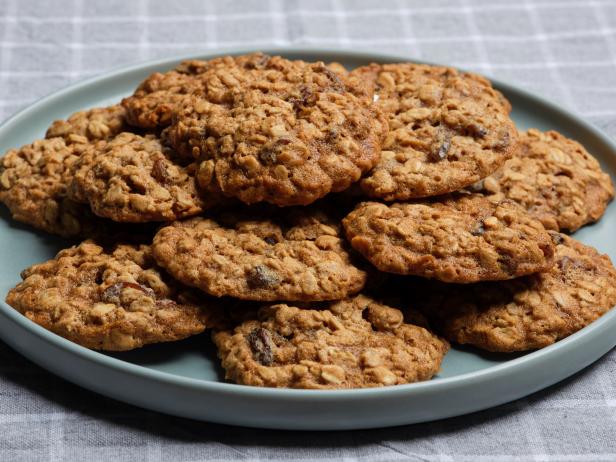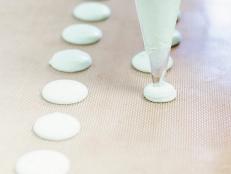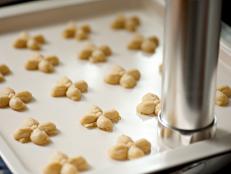How to Keep Cookies Soft
Plus, how to revive cookies that have turned hard (yep, it's possible).

sorendls/Getty Images
By Fraya Berg for Food Network Kitchen
Fraya is a chef and a contributing writer at Food Network.
All cookies are soft when they come out of the oven and snagging one when it’s just cool enough to not burn your tongue is as good as a soft cookie can get. If only they could stay that soft for a week! We know that’s not possible, but there are several factors that affect how soft your cookies are when they cool, and how soft they remain a few days later: ingredients, oven temperature and storing. The good news is that you can manipulate these elements to create perfectly soft cookies. We walk you through what to do.

Cris Cantón/Getty Images
Ingredients to Keep Cookies Soft
The ingredients that make cookies soft do double duty: they add and maintain moisture and they add flavor that develops while the cookies bake.
Butter is more than 15% water, so it plays a role in making cookies soft by adding water and fat, which contributes flavor and tenderness. Melting the butter you’re using can make the cookie softer.
Brown sugar comes out of the package very moist: its chemical makeup causes it to draw in water under the right circumstances: a fast bake at a high oven temperature. Slightly underbaking cookies with brown sugar in them makes them softer as well. Just make sure to store brown sugar in an airtight environment so it doesn’t dry out.
Flour plays its part by contributing protein. The lower the protein, the softer your cookies will be. All-purpose flour is a medium-protein flour, making for mediumly-soft cookies. Cake flour is low in protein and you can substitute it into cookie recipes for all-purpose flour 1:1. The results will be very tender cookies. Just make sure you don’t use self-rising flour.
Egg yolks (not the whites) bring fat to the mixing bowl, and that fat will help prevent the development of the gluten in the flour. They’ll also help maintain an even emulsion when mixing dough. We don’t recommend substituting eggs willy-nilly, but look for a cookie recipe that calls for egg yolks to start with.
Light corn syrup is another ingredient that you can add to cookie dough that will help it stay softer longer. The corn syrup you buy at the grocery store is not the high-fructose corn syrup that soft drinks are made with; it’s a sugar that is liquid at room temperature and helps other sugars say liquid at high heat. It’s used for making artisanal candy, and it helps cookies stay fresher longer. All it takes is a tablespoon in a batch of dough.

ThitareeSarmkasat/Getty Images
Baking Techniques to Keep Cookies Soft
Baking at 375 degrees F as opposed to a lower temperature will help cookies stay soft: they’ll bake faster which means they aren’t in the hot, drying air of the oven too long.
Pull the cookie sheet out of the oven when the cookies are just set: underbaking is better than overbaking.
Baking cookies quickly in a hot oven – at 375 degrees F as opposed to a lower temperature – will make for soft results. They’ll bake fast instead of sitting and drying out in the oven’s hot air.
Ever so slightly underbaking your cookies will give you softer results than cooking them the full amount the recipe says. About 1 minute should do the trick.
Remove cookies from the baking sheet as soon as they set. Most recipes tell you to leave them on for three to five minutes after taking them out of the oven. That time on the cookie sheet is still baking time because the sheet is hot. As soon as they’re cool enough to move without falling apart, transfer cookies to cooling racks.

Eva-Katalin/Getty Images
Storing Tips to Keep Cookies Soft
Store cool cookies in an airtight container (not a cookie jar with a loose lid) at room temperature. Putting cookies, cakes or breads in the refrigerator will dry them out. It’s just the physics of how refrigeration works: the fridge removes moisture from the air as it cools, so it will suck moisture out of your cookies.
No matter what, three days is the maximum amount of time you should keep cookies unless you’re freezing them, which is the best way to store most cookies long term (up to six weeks).
Putting a slice of fresh white bread in the container with the cookies will help the cookies stay soft: fresh bread is moist, and that slice will give up its moisture for the greater good: keeping the cookies from drying out. We recommend white bread so that no flavor is transferred to the cookies. Keep an eye on the bread to be sure the moisture level isn’t high enough to cause the bread to mold.
How to Soften Hard Cookies
We’ve all been there: no matter how diligent we are, someone else left the lid off the cookie container. You’ve got two options: the microwave or a terra cotta disc.
Warm cookies are soft cookies, and the microwave can help revive a cookie. Wrap a cookie or two in a slightly damp paper towel and microwave on 50% power for 10 seconds. Repeat if necessary, being sure the paper towel isn’t too wet.
A terracotta disc is a piece of unglazed clay that can absorb water and then release it. Sold as brown sugar savers, they can also gently release water into your cookie container. Soak it for 15 minutes, then be sure it’s not dripping water when you put it in the container with the cookies. In an hour or two you’ll have softer cookies.
Terra Cotta Discs Can Revive Hard Cookies
Soft Cookie Recipes

Renee Comet, 2013, Television Food Network, G.P. All Rights Reserved
This is the gold standard when it comes to chocolate chip cookies: crisp edges and a soft interior. If you want them even softer, use cake flour in place of the all-purpose.

Matt Armendariz, 2014, Television Food Network, G.P. All Rights Reserved
These sugar cookies incorporate extra egg yolks, making for pillowy-soft results.

Teri Lyn Fisher
The stripes inside these soft cookies are easier to achieve than you think. The thick dough ensures a soft cookie.

Renee Comet
Soft, chewy and dotted with chocolate chips, our lightly sea-salted almond flour cookies are gluten free. Cookies for everyone!

Caitlin Ochs
Our oatmeal cookies can be chewy or cakey: you decide. Baking them immediately or keeping the dough in the fridge overnight is the deciding factor.
Related Links:




































